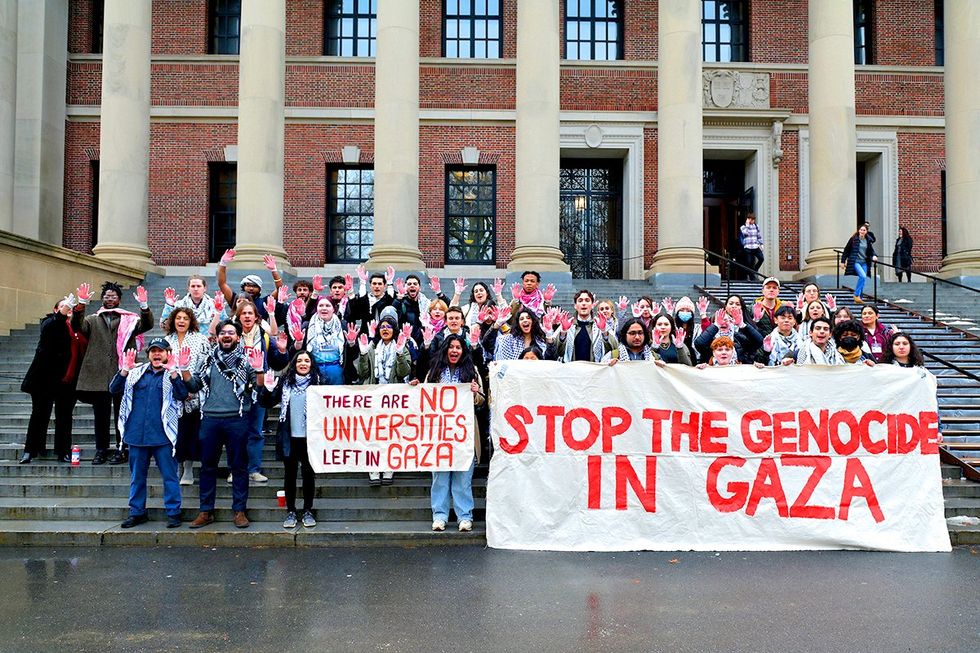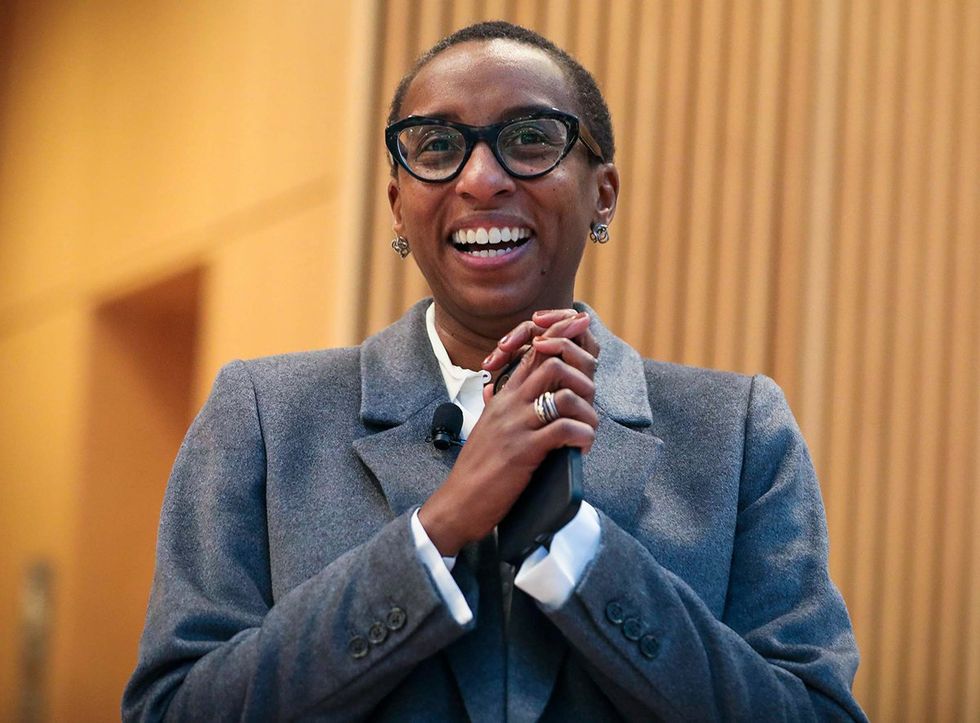On January 2, 2024, Harvard University witnessed a significant yet, in many ways, expected event involving a Black leader — the resignation of its president, Dr. Claudine Gay. While initial reports suggested that the departure was linked to the repeated criticism of the university’s response to the Hamas attack, and backlash from her congressional testimony spiraled into allegations of plagiarism accusations, a deeper examination reveals a more complex narrative.

In truth, Dr. Gay's resignation appears to be the result of a relentless onslaught from conservative policymakers and billionaires, namely opponents of affirmative action and DEI, some of whom the public has learned dubious connections to plagiarism and offensive comments about marginalized communities.
Dr. Gay assumed the presidency of Harvard on July 1, 2023, becoming the university’s first Black president. With high hopes of steering the institution into a new era of progress, especially at a time where the promise of equity from many in marginalized communities have been simultaneously attacked by conservatives, she hoped to push the university to even greater heights. Her tenure, though brief at just over six months, was emblematic of the significant challenges faced by Black leaders, especially Black women, in high-stakes roles.
Far too often, Black leaders are hired or promoted to leadership roles in companies at times of crisis, expecting that they will immediately fix decades-long issues. Often referred to as the “glass cliff,” these leaders are elevated into senior leadership roles within companies to be organizational saviors, just to then quickly terminate them for not solving problems overnight. This underscores a troubling trend where Black leadership is disproportionately challenged to undermine their authority and derail progress toward inclusivity and equity.
Dr. Gay assumed her presidency the same week that the U.S. Supreme Court reversed precedent by striking down affirmative action programs in college admissions. On June 29, 2023, in a decision divided along ideological lines, the six-justice conservative majority invalidated admissions programs at Harvard and the University of North Carolina. This decision ended the ability of colleges and universities to do what most say they still need to do: consider race as one of many factors in deciding which of the qualified applicants is to be admitted.
Lately, national politics have turned into the racial exhaustion of yesteryear and a culture war that aims to place historically oppressed communities to the bottom. The past decade has been filled with Republican-led legislatures passing laws to suppress democracy, restrict LGBTQ+ rights, control pregnant peoples' bodies, and ban books to prevent accurate teaching of racial history. The public is experiencing whiplash at how quickly conservative donors and policymakers have attacked affirmative action, DEI programs, and any proponent who stands in its way.
Even before Dr. Gay assumed her role, in her time as Dean of Social Sciences at the Harvard Faculty of Arts and Sciences, Dr. Gay’s leadership was marked by a commitment to fostering an inclusive academic community. She implemented initiatives aimed at addressing systemic inequalities within the university; launched a task force examining the university’s “visual culture” on campus; and disciplined multiple Harvard professors for alleged sexual misconduct, including Martin Nowak for his contacts with sex offender Jeffrey Epstein.
Dr. Gay quickly found herself under the scrutiny of influential individuals who seemed determined to undermine her presidency from the onset of the announcements. The key players in this campaign against Gay are conservative policymakers who, fueled by ideological differences, sought to disrupt her leadership. Their attacks extended beyond policy disagreements, delving into personal and professional realms. Their goal was to create an atmosphere of instability, forcing Dr. Gay to step down under pressure.

Further complicating matters is the involvement of donors with ties to Harvard. Some of these individuals have spouses who themselves faced plagiarism accusations, raising questions about the sincerity of their concerns regarding academic integrity. It's a perplexing scenario where those pointing fingers at Dr. Gay have associations with similar controversies within their own circles.
Bill Ackman, a billionaire hedge-fund manager and Harvard alum, accused Gay of antisemitism and plagiarism. He was also a major player in what increasingly became a campaign against Dr. Gay. The Guardian noted, “In the past month alone, the 57-year-old has tweeted about Gay, Harvard, or both, more than 100 times to his 1 million followers.” The day of Dr. Gay’s resignation, he competed with himself with a 4,000-word X post about “racism against white people,” among other principles of faux intellectualism.
Ironically, days after Dr. Gay’s resignation, Ackman’s wife, designer Neri Oxman, was accused of improperly citing multiple authors and Wikipedia in her doctoral thesis. This is not an attempt to attack a person’s family member, but to understand if Ackman’s issue is against plagiarism or Dr Gay. While Ackman didn’t back down from his scrutiny of Dr. Gay — even saying she should not remain as a faculty member due to her “serious plagiarism issues” — he defended his wife, saying “part of what makes her human is that she makes mistakes.”
In her resignation, Dr. Gay apologized for her mistakes. But an independent review indicated she did not violate Harvard’s standards for research misconduct. And after the initial allegations, Gay requested four corrections in two articles; the university later announced Dr. Gay would make three additional corrections to her 1997 doctoral dissertation.
In Dr. Gay’s resignation letter, she commented that she has been called the N-word more times than she can count during her time as Harvard president. It begs the question: Was this an orchestrated attempt to stifle progress in creating a more diverse and equitable academic environment at Harvard and other academic institutions?
The resignation of a Harvard president, even under dubious circumstances, sends shockwaves through the world of academia and raises questions about the interference of politics in higher education.
Furthermore, this incident serves as a reminder of the challenges faced by leaders committed to advancing DEI efforts, even if it is simply the mere presence of non-white people serving in institutions of higher education. It highlights the vulnerability of those striving to bring about meaningful change in institutions with long-established traditions and power structures.
Gay’s departure from Harvard is a cautionary tale about the fragility of Black leadership in the face of political agendas — no matter the setting. As the academic community continues to grapple with the aftermath, it is imperative to reflect on the broader implications for institutions striving to create environments that foster diversity, equity, inclusion, and belonging.
It serves as a call to action to support and protect Black leadership and to recognize the valuable contributions of Black women in positions of power. As we reflect on this during Black History Month, it is essential to acknowledge the broader implications for diversity, equity, and inclusion efforts and the need for sustained commitment to creating environments that truly welcome and celebrate diversity.

Let us also honor the trailblazers like Dr. Claudine Gay, whose leadership, though challenged, continues to inspire the pursuit of a more just and equitable society. It is a poignant reminder of the work that remains and the collective effort required to dismantle systemic barriers, ensuring that the contributions of Black leaders are recognized, valued, and protected.
Preston Mitchum is the Chief Executive Officer of PDM Consulting LLC and a vibrant cast member on Bravo TV’s Summer House Martha’s Vineyard. As a proud member of the LGBTQ+ community and an openly gay Black man, he actively incorporates his identity and experiences into his professional and public life, advocating for inclusivity and representation across all platforms he engages with.
Views expressed in The Advocate’s opinion articles are those of the writers and do not necessarily represent the views of The Advocate or our parent company, equalpride.















Charlie Kirk DID say stoning gay people was the 'perfect law' — and these other heinous quotes
These are some of his worst comments about LGBTQ+ people made by Charlie Kirk.